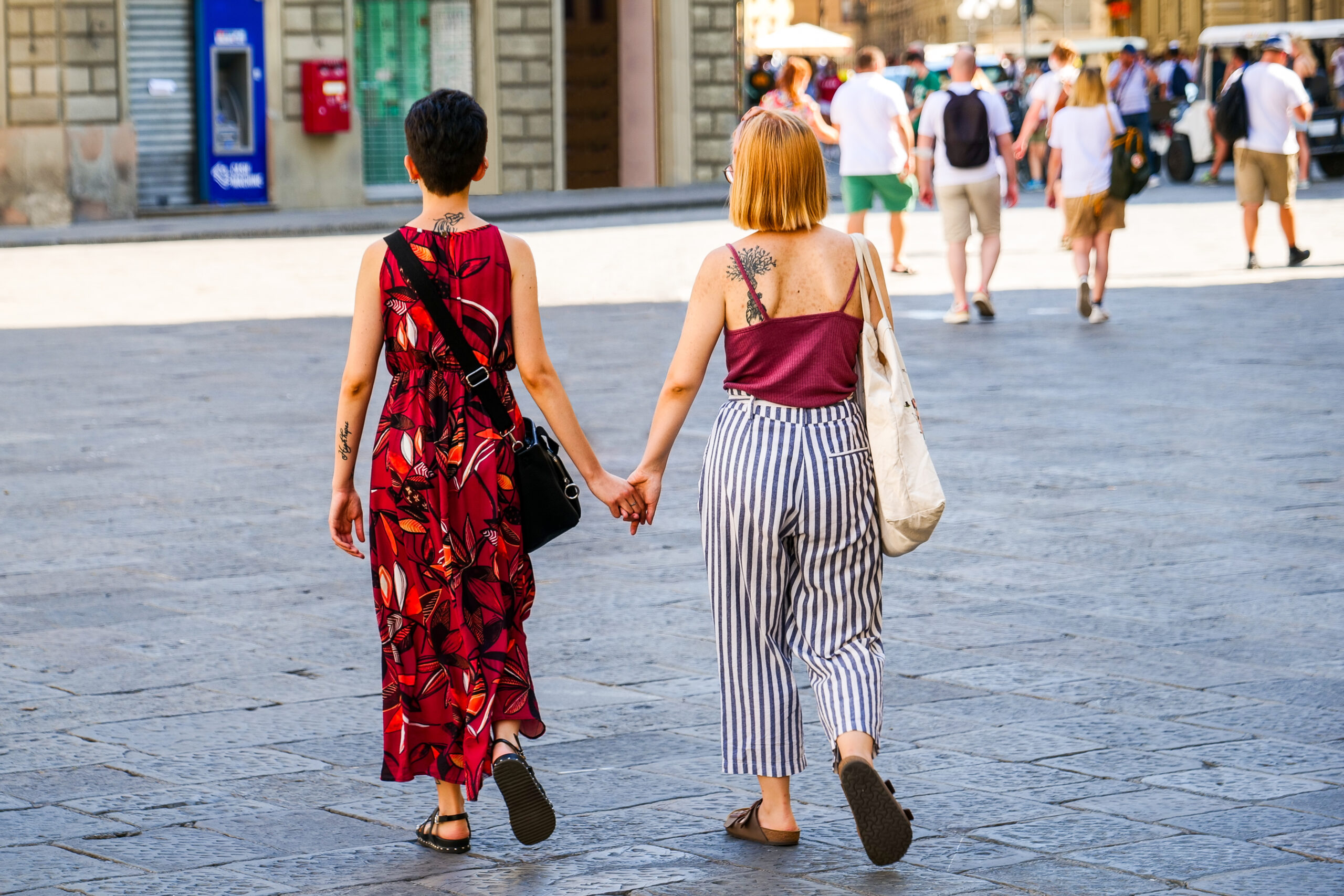Catholics and their pets will gather on church lawns throughout the country this month to participate in what has become an annual rite of fall, seeking blessings from priests to commemorate St. Francis of Assisi, whose feast day was October 4.
While the photos from these events usually prompt a bit of news coverage, including at America, it is Pope Francis’s comments on other potential blessings that have generated the most analysis and commentary as of late.
Last Monday, the Vatican released a text in which Francis, who is presiding over a global gathering of Catholic leaders discerning the church’s future, wrote that he is open to the possibility that priests might someday offer blessings to same-sex couples.
When Catholic same-sex couples seek a blessing from a priest, it often flows from a deep faith in God.
The document, a response to a series of questions from a group of five cardinals challenging the pope to clarify church teaching on a range of issues including homosexuality, is clear that the church’s definition of marriage remains unalterably the union of one man and one woman. But Francis said that upholding Catholic teaching on marriage does not mean church leaders “become judges who only deny, reject, exclude.”
Rather than “lose pastoral charity, which must be part of all our decisions and attitudes,” priests and other church ministers can discern a request for a blessing, wrote Francis.
“When you ask for a blessing you are expressing a request for help from God, a prayer to be able to live better, a trust in a father who can help us live better,” the pope wrote. He added that if priests were to offer such blessings, they would likely remain an unofficial practice, as “pastoral prudence in certain circumstances need not be transformed into a norm.”
Priests are regularly asked to bless any number of things. I have participated in pet blessings and asked a priest to bless a new home. A few years ago, I witnessed a priest bless dozens of guns as part of a kickoff to hunting season in rural Wisconsin. I have read about special events for blessings of motorcycles, herbs and sneakers. During one of my recent daily morning searches for Catholic news, I stumbled on a newspaper article about a parish that had finished a renovation of its bathrooms, accompanied by a photo showing a priest, with his arm elevated, flinging drops of holy water in the direction of two porcelain urinals.
Priests are regularly asked to bless any number of things. I have participated in pet blessings and asked a priest to bless a new home.
That particular image reminded me of a conversation I had several years ago with a young Benedictine monk who lamented to me that priests are allowed to bless almost anything—though definitely not gay and lesbian couples. It is unclear how many same-sex couples have sought blessings from the church, but as recently as 2021, the Vatican said that priests could not offer them a blessing because God “cannot bless sin.”
Might that approach to blessings of same-sex couples soon be changing?
Gay and lesbian Catholics who remain part of the church have discerned that their faith is worth enduring the church’s official condemnation of homosexual acts and its political campaigns against LGBTQ civil rights. That faith is often deep, considered and thoughtful, given the obstacles they face in seeking acceptance.
So when Catholic same-sex couples seek a blessing from a priest—and this already happens, regardless of Rome’s rules—it often flows from a deep faith in God. It also certainly carries risk, either the risk of rejection for the couple asking for the blessing or the risk of disappointment from the priest who feels he cannot offer a blessing. It is a request that is never made lightly.
The pope seems attuned to the pastoral needs of all Catholics, including those in same-sex relationships who desire a blessing.
Some priests will gladly offer a blessing, perhaps not in a way that could be confused for a wedding blessing but in a manner that nonetheless implores God to bless the two people in various ways. But even the most pastoral priest may bristle at such a request, especially if he cannot be guaranteed discretion. If such a blessing were to be photographed and shared on social media, or result in a letter to a bishop from an unapproving parishioner, the priest could face severe consequences.
The pope’s comments do not necessarily eliminate the pastoral complexity of such requests, especially if the permission for offering such a blessing is not accompanied by a change in church teaching on homosexuality. But the comments might create conditions for pastorally fruitful conversations between a priest and Catholics in a same-sex relationship as they discern the motivations for asking for a blessing.
Of course, even if the church does someday permit priests, deacons and men and women religious to bless same-sex couples, it is unlikely there will be a stampede for such blessings. After all, even heterosexual couples are increasingly unlikely to ask the church for a blessing. The number of church weddings in the United States is plummeting. It is also unlikely that allowing priests to offer such blessings would completely change the reputation of the church as an institution that is hostile to LGBTQ people, though it might surprise some people who never thought they would see such a welcoming gesture from the church.
But that is not exactly the point of the pope’s statement. Rather, he seems attuned to the pastoral needs of all Catholics, including those in same-sex relationships who desire a blessing.
The significance of a blessing
Why might a same-sex Catholic couple, aware that their church does not view their relationship as holy, nonetheless seek a blessing from a priest?
For starters, blessings help believers grow in their faith, and seeking and offering blessings is an essential element of our faith. As the U.S. Conference of Catholic Bishops puts it, blessings “prepare us to receive the grace of the sacraments and help us to grow to be more like Christ.” The Catechism of the Catholic Church states, “every baptized person is called to be a ‘blessing,’ and to bless.”




